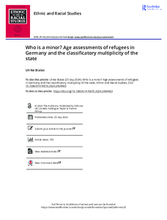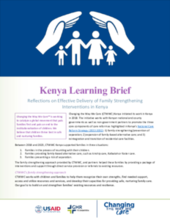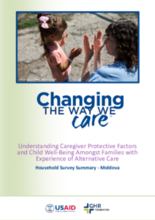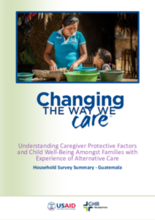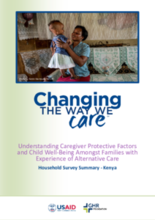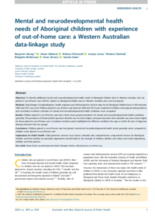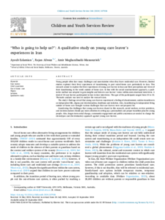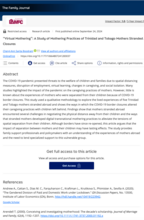Displaying 131 - 140 of 14574
This study examined the categories that states use to classify and govern migrants. Unaccompanied minors and adult asylum seekers are treated very differently regarding their asylum cases and residence permits. The study focused on Germany, where the courts and youth welfare offices commission age assessments to decide whether young migrants will be considered minors or adults. These assessments are carried out by forensic medical examiners and social workers, respectively, who work with very different understandings of what constitutes age.
This learning brief documents the process of care reform policy development and financing improvements in Nyamira County, Kenya, following the enactment of the Child Policy and the Persons with Disabilities Act, 2023.
This is a summary of a household survey conducted in Moldova by CTWWC to provide insights for policymakers and practitioners on the impacts of interventions to support reintegrating families and those at risk of separation. For Moldova, CTWWC adapted its survey tool to fit the local context by adjusting terminology and phrasing of some questions and responses, and removing questions that were not relevant.
In Guatemala, the survey in 2023 targeted all families who had participated in a case management process with CTWWC due to a reintegrating child or a child identified as at risk of separation, as well as a sample of households where the caregiver had attended a parenting school.
A key feature of CTWWC’s theory of change is building evidence on children's care and reform, particularly regarding reintegration from residential care, transitions to family-based care, and preventing separation.
The objective of this study was to identify additional mental and neurodevelopmental health needs of Aboriginal children born in Western Australia, who are placed in out-of-home care (OOHC), relative to Aboriginal children born in Western Australia who were not placed.
This study explores Ukrainian responses to internally displaced people during the first and second waves of war-induced displacement and internal migration in Ukraine, which took place after the annexation of Crimea in 2014 and after the full-scale invasion of 2022. It also addresses the unique challenges faced by Ukrainian social work professionals in supporting displaced people, service people and their families, disabled veterans, and orphaned children as the war continues and also for resettlement in a post-war context.
This research aimed to explore the lived experiences of young care leavers in Iran and their perceptions and views of their transitioning to the world outside of home care.
This study used a qualitative methodology to explore the lived experiences of five Trinidad and Tobago mothers stranded abroad and shows the ways in which the COVID-19 border closures altered their caregiving practices with children left behind.
Calling all humanitarian and child protection leaders, advocates, donors, and supporters. The Alliance for Child Protection in Humanitarian Action, the Global Child Protection Area of Responsibility, UNHCR, and Save the Children, invite you to the global launch of their latest report, ‘Unprotected: Analysis of Funding for Child Protection in Humanitarian Action in 2023’.

